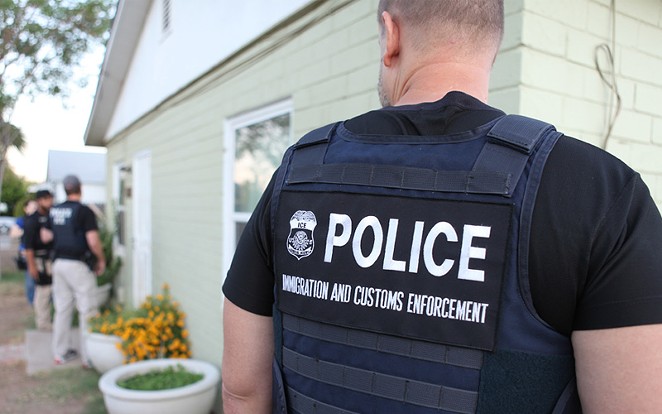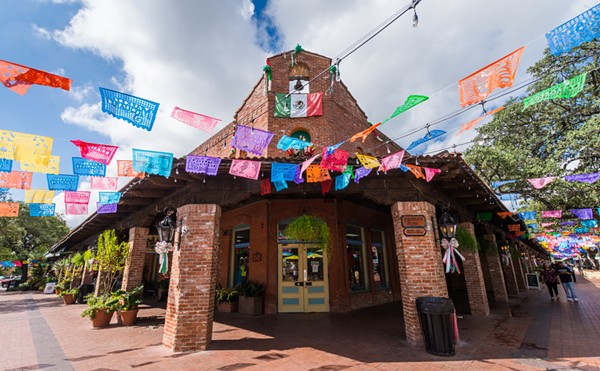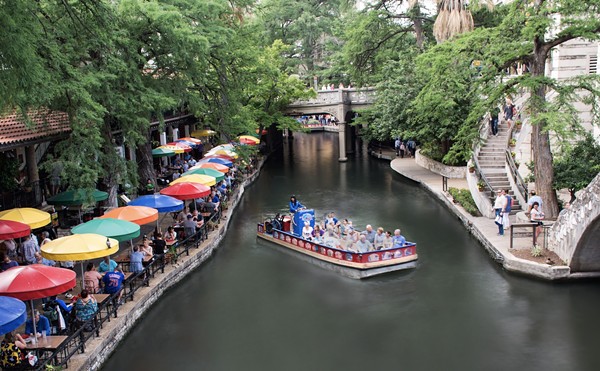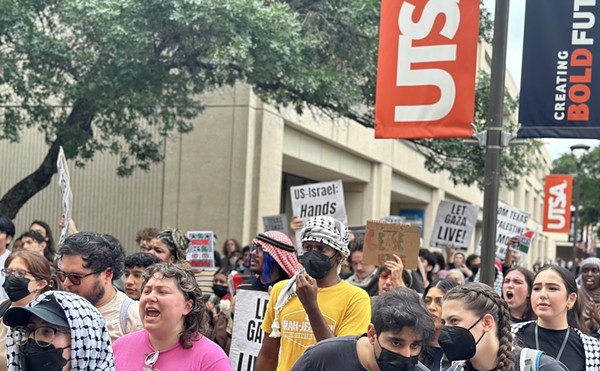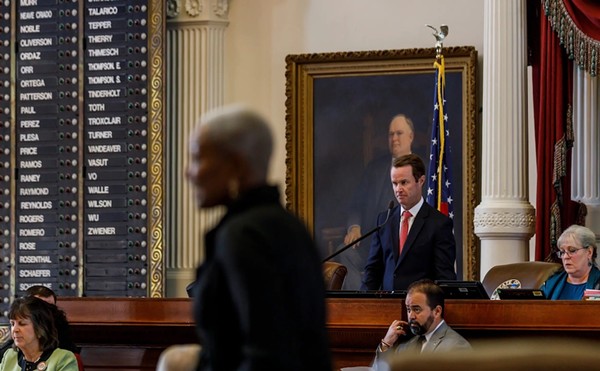On the eve of the next legislative session, taking on the supposed threat of "sanctuary cities" has again become a priority for conservative lawmakers in Texas.
And, as with every time they resurrect this zombie issue, it seems to have much to do with politics and little to do with actual public safety – if you believe police across Texas' largest cities, that is. In fact, law enforcement in major metros across the state, including San Antonio, have implemented what have in the past been called "sanctuary cities" policies.
Which begs the question: Is San Antonio really a sanctuary city?
Until recently, it's been a question without any real yes-or-no answer, mostly because the term itself has been amorphous when invoked by many Texas conservatives.
While Gov. Greg Abbott recently told Fox news, "I have used my powers as governor of Texas to withhold funds to cities or counties that are declaring themselves to be sanctuary cities," his office later clarified that it hasn't actually blocked any state funds over the issue. That's because nobody has yet run afoul of this new red-line distinction – that if you don't honor U.S. Immigration and Customs Enforcement requests to keep people in custody, even when charges have been dismissed, then you're a sanctuary city.
Pretty much every jail in Texas currently honors these so-called ICE detainers (although that could change in Travis County very soon). Yet, the issue resurfaced even earlier than usual this time around, likely a result of the anti-immigrant rhetoric blaring out of the Donald Trump campaign. Last year, Abbott publicly sparred with Travis County Sheriff Lupe Valdez when she announced an agreement with the feds in which ICE wouldn't ask the county to hold people accused of or jailed for minor offenses – which is actually in line with the feds' stated immigration enforcement priorities. Abbott thundered about how he'd block state funding to officials like Valdez who refuse to cooperate with federal immigration authorities. That hasn't happened; the arrangement in Dallas is apparently working just fine.
By this definition, San Antonio is decidedly not a sanctuary city. If you're booked in jail here, cops will still run your fingerprints through a federal database that will alert ICE if you've got a dubious immigration status. Then it's ICE's call whether or not to pick you up. When ICE flags someone, some counties will hold them for a couple days – even if the person has made bail, their term of incarceration is over, or charges have been dismissed. Some county jails will hold you for weeks. Bexar County has been accused of holding people for months who wouldn't be in jail if not for ICE's request. While incoming Bexar County Sheriff Javier Salazar's stance on immigration sounds softer than his Republican predecessor, he has said he'll still work with the feds on immigration detainers.
This summer, San Antonio attorney Lance Curtright sued Bexar County on behalf of 36-year-old Julio Trujillo, who was kept in jail 76 days after local officials dismissed the misdemeanor assault charge that got him flagged by immigration officials in the first place. The lawsuit argues the process for ICE detainers in Bexar County is haphazard and unconstitutional.
In his lawsuit, Trujillo says he asked officials numerous times why he was still in jail after his charges were dropped, even when week after week passed by and he heard nothing from ICE. When his girlfriend finally reached someone at ICE, she learned the feds didn't even have him on their list – even though when Trujillo was arrested months earlier, ICE had filed a request to keep him jailed if his case got resolved, citing a final order of removal as probable cause to consider Trujillo a "removable alien." According to the lawsuit, ICE didn't even get a final removal order until some six months later, on June 8, the day they picked Trujillo up from the Bexar County jail – just two days after he hired a lawyer to seek his release. (The dismissed misdemeanor assault charge appears to have been Trujillo's only arrest here.)
"If ICE wants to detain someone, they should go get a warrant," Curtright told the Current. "That’s basically what our lawsuit is about.”
Still, the kind of anti-sanctuary cities legislation filed in Texas goes beyond ICE detainers. To state lawmakers like Sen. Charles Perry, who has already filed a bill for the upcoming session that mirrors his last failed attempt to crack down on sanctuary cities, even a place like Houston fits the definition. Which seems like a fundamental misunderstanding of how federal immigration enforcement even works, especially when you consider Harris County for many years had an arrangement with the feds that effectively deputized some sheriff's officers to assist federal immigration agents. Immigrant rights advocates say that's why Houston, a so-called sanctuary city, at one time locked up more undocumented immigrants than any other jail in the state.
Perry's legislation seems to conflict with the kind of policies supported by police chiefs across the state – the kind that explicitly tell local police that federal immigration enforcement is not their job. "While we don't label ourselves a 'sanctuary city,' our officers do not ask for proof of citizenship for people we encounter," San Antonio Police Department spokesman Sgt. Jesse Salame told us. He directed us to SAPD's current policy:
Officers will not detain and/or arrest an individual based on the fact or suspicion that they are in the United States
illegally.
1. Officers will not ask any person for proof of citizenship or legal residency.
2. Officers are authorized to detain based on reasonable suspicion only if that the person is suspected of being
involved in criminal activity or a witness to criminal activity
3. Officers are authorized to arrest persons based on probable cause that a crime has been committed. Immigration
status alone is not probable cause for an arrest.
4. Officers having reasonable suspicion that a person or persons may by a victim or suspect in human trafficking
will immediately notify a supervisor and the appropriate follow-up unit, and will handle matter in accordance.
In previous sessions, some chiefs and sheriffs have argued that the kind of sanctuary cities legislation proposed by Perry could make it harder for them to do their jobs – which is to get witnesses to talk (even undocumented ones), solve crimes, and keep the local community safe. Others worry it could open up the door to racial profiling. Perry's bill would punish any agency that "discourages the enforcement of immigration laws." Under the bill, agencies can't "prohibit or discourage" any cop, corrections officer, or booking clerk from asking about the immigration status of someone "under a lawful detention" and then following up with immigration authorities. So under this legislation, if you're a cop who thinks immigration enforcement should be a regular part of your job, departments would be hard pressed to tell you otherwise. You could file a complaint with the Texas Attorney General, which could then threaten to cut your department's funding.
Meanwhile, a Trump presidency could very well redefine what we mean by the term "sanctuary city." Officials from Los Angeles, San Francisco, New York, Denver, Philadelphia, and Chicago have all declared that they will not cooperate if Trump follows through on his promise to enact mass deportations; Trump has vowed to block federal funds to those police departments.
Officials here haven't yet come out with such a public stance on the issue. But due to national or state politics, San Antonio could soon have to decide whether or not it really belongs in the sanctuary cities category.

